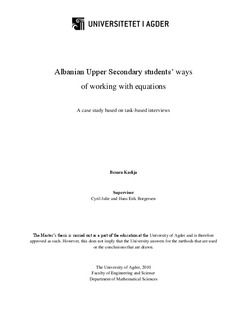Albanian upper secondary students´ ways of working with equations : a case study based on task-based interviews
Master thesis
Permanent lenke
http://hdl.handle.net/11250/138090Utgivelsesdato
2010Metadata
Vis full innførselSamlinger
Sammendrag
Equations are an important part in algebra in the Albanian school mathematics curriculum. This case study focuses on the way six Albanian students approach and solve equations. The students that took part were in the first year of upper secondary school (10th school year), and they have chosen to have more mathematics than the knowledge required. Students are motivated to work with mathematics, and their mathematics background is approximately the same. They came from different lower secondary schools but the programs that they have followed are the same.
The research question that has directed this research is:
How do the Albanian students in the study approach and solve equations?
I had in focus a class with 34 students who firstly did a test dealing with equations. According to their performance on the test, I divided the students into three groups: high performing, middle performing, and low performing. I have picked two students from each group: one girl and one boy, and I have interviewed them. The method that I have used to interview the students is the task-based interview where the questions are based on the five requests of Newman‟s technique. The students were presented with four cards, where they had to choose two of them: the most difficult and the easiest, and to solve one of them. The cards contain two equations of these kinds: linear, quadratic, rational, and irrational. On the cards was also a word problem which was the same for all the cards.
During the interview, I have made questions that are related with their reasoning in the solution process, and many times I have also tried to give hints to them. The interviews have lasted for approximately 45 minutes, where some of the time was used to ask some additional tasks, but I have analysed only the part where the students have solved tasks on the cards.
The students in general showed that they knew how to solve equations, even if they lack some parts of the complete solution. They have shown that the word problems (simple ones) are not a problem for them, and the translating from word problem to equation is not a difficult for them. They have demonstrated to have a general knowledge on equations, even if sometimes this knowledge seems to be more of an instrumental understanding than a relational understanding.
The students have shown difficulties in dealing with domain and checking part, because for some of them these are not seen as part of the solution of an equation. They have also shown some difficulties with the quadratic equations, and the main difficulty that the students have shown is the solution of an irrational equation. Most of the students have said that irrational equations are more difficult than the other kinds of equation or they have shown lack of understanding during their solutions.
Beskrivelse
Masteroppgave i matematikkdidaktikk- Universitetet i Agder 2010
